 It’s our pleasure today to publish this post, jointly written by the Georgia Law team that last week was named Best Delegation at the Southeast Model African Union, and so is eligible to compete in the 35th annual national competition in February in Washington, D.C. The 6 students on the team each won individual achievement awards at the event, which was hosted by the University of Georgia African Studies Institute and cosponsored by the law school’s Dean Rusk International Law Center. They write:
It’s our pleasure today to publish this post, jointly written by the Georgia Law team that last week was named Best Delegation at the Southeast Model African Union, and so is eligible to compete in the 35th annual national competition in February in Washington, D.C. The 6 students on the team each won individual achievement awards at the event, which was hosted by the University of Georgia African Studies Institute and cosponsored by the law school’s Dean Rusk International Law Center. They write:
Introduction
“This is Africa’s time.”
So said the keynote speaker and Honorary Consul of Sierra Leone, Cynthia Jarrett-Thorpe, to delegates at the 20th Annual Southeast Model African Union, This was the beginning of what turned out to be an eventful competition. Over the course of the next 2-1/2 days we would be tasked with working together in various negotiations, in order to provide solutions to complex situations on behalf of the country we represented, the Republic of Niger.

► Rebecca Wackym left, listens to statement by delegate from South Sudan
► Rebecca Wackym, 1L, Executive Council
My role as a delegate for the Republic of Niger in the Executive Council was not only as an advocate for the interests of Niger, but also a servant to the interests of the entirety of the African Union. As a member of the Executive Council, I was not required to draft or advocate for a resolution. I introduced a hypothetical crisis situation caused by Boko Haram to the committees, who then had to create resolutions to solve the crisis.
Regarding the process, I had to work with other delegates in the Executive Council to first decide on how to setup the crisis in a way that would guide them to a solution while simultaneously, allowing each committee to achieve the goals set forth in the Union’s Agenda 2063.
The Executive Council ferociously debated how we wanted to achieve these goals in the context of the Boko Haram crisis. For example, we contemplated:
- Would we ask the Committee on Peace and Security to involve states with more resources to combat Boko Haram?
- Would we rather rely on our own resources, even though we had far less than the Americans?
I had to advocate for a position that struck a balance between safety and sovereignty of Niger and the goals of the Agenda. We eventually negotiated an agreement to ask the committees to formulate plans in a tiered manner, which put the African Union’s sovereignty first, but allowed for support outside of the Union.
However, our work did not end with tasking the committees. We also were tasked with creating a final report, called a “communiqué.” We had discretion to adopt an entire committee’s resolution, or certain parts, or to scrap the entire resolution and draft our own. At this point, we divided into groups so that we could discuss the edits, if any, that we wanted to make to the resolution. I was asked to look over the Committee on Democracy, Governance, and Human Rights’ resolution because the other delegates believed that my whole t3 months in law school afforded me more expertise in regards to judicial reform in the African Union. Drafting the communiqué might have been one of most hectic couple of hours, but with exceptional teamwork we churned out a comprehensive report.
My takeaway from this experience is that the diplomatic system works well when all the parties decide put the interest in solving the crisis above their own individual interests. The Executive Council ran efficiently when we all saw each other as colleagues working towards a common goal rather than a competition of whose interest would be given most prominence.
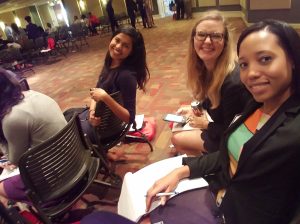
From left, team members Shummi Chowdhury, Amanda Hoefer, and Chanel Chauvet
► Amanda Hoefer, 1L, Committee on Democracy, Governance and Human Rights
I was fortunate enough to be able to participate in the 2016 Southeastern Model African Union Competition held at UGA, with the support of both the Dean Rusk International Law Center and the UGA Department of African Studies. I represented the Republic of Niger in the Committee on Democracy, Governance, and Human Rights, and helped with the drafting of four resolutions, addressing a wide spectrum of issues, including the scope and jurisdiction of the African Court on Human and Peoples’ Rights, the use of transitional justice as a means of compensating victims of human rights abuses, the reduction of corruption throughout the continent, and the African Union’s role in promoting economic growth throughout the diaspora.
The most rewarding aspect of this experience was working with undergraduate students with little experience in mock diplomacy; having participated in Model United Nations in high school, I was able to use my rusty knowledge of parliamentary procedure to help steer my fellow delegates to a rewarding and enriching resolution. Diplomacy competitions are an incredible opportunity to flex your teamwork muscles and to collaborate on creative solutions to complex problems; in a word, competitions like SEMAU are empowering. I enjoyed watching those in my committee who had never participated in a similar competition become increasingly confident in their public speaking and critical thinking skills, and loved having a chance to dig into complicated diplomatic problems myself.
I also enjoyed having the chance to learn about African culture and politics, having never had a particular opportunity to immerse myself in the topic before this competition. While preparing for the competition during the Fall semester of my 1L year was a bit stressful, my inner-diplomacy nerd jumped at the opportunity to do some research about Niger and the AU, and to delve into the complex policy problems that we were asked to face. I’m incredibly grateful to both Georgia Law’s Dean Rusk International Law Center and the University of Georgia African Studies Institute for their patronage and support in this endeavor, and look forward to competing again at the national competition in February.

On behalf of Niger, Johann Ebongom (center) joins in discussion
► Johann Ebongom, LLM, Committee on Economic Matters
The Model African Union is known as a competition in which student delegates represent their selected countries and develop an understanding of African issues from an African perspective. Practically speaking, the Model African Union is a simulation of the African Union Summit which occurs twice a year in Africa.
At the 20th annual Southeastern Model African Union competition, I had the opportunity to participate in the Economic Matters Committee. We convened on the afternoon of November 3, to discuss on two main agenda topics:
- Promoting a balanced and inclusive economic growth: aspirations and implementation
- Promoting a sustainable ecosystem and climate resilient economies: aspirations and implementation
The objective was to debate and engage in diplomatic principles and standards to ultimately resolve major economic issues currently harming African countries. Some of these issues include concerns of water resources and agricultural development, management of mineral resources, debt relief, energy and development, multilateral trade negotiations, and food security. The committee created a resolution that represented the majority opinion of the different countries present. Following negotiations, we presented the resolution to Heads of State and Government during the General Assembly on the last day of the event for their final approval.
The Delegation of Niger recognized that despite a sustained agricultural productivity growth, a large number of households continue to face food insecurity and malnutrition problems due to on-site effects of soil degradation and the mismanagement of revenues from the exportation of the continent’s natural resources. At this point, it was clear that our challenge would not only be that of enhancing our agricultural production to meet the increased food demands of the expanding population, but also to focus on the judicious use of soils in order to promote a sustained productivity in the foreseeable future.
Niger promoted the implementation of a tax, on the total revenue from natural and agricultural resources exportation, which would be deposited and managed at the level of the African Union through an African Fund for Development. The funds would then be distributed back across the continent to support integration-related projects which will lead to the inclusive economic growth of the continent. Niger supported this motion using the slogan:
“Give what you own for the benefit of the continent!”
Niger also reminded the delegation about the importance of a collective solution that would benefit the 54 African countries. We also urged the honorable house to vote for a resolution that will take into account the effects of the current Boko Haram security issue, which directly affects the economy of a number of western African countries, including Nigeria, Cameroon, Chad, and Niger. Niger was leading the negotiations and after long hours, a compromise was found! The resolution was adopted by a 2/3 majority of the house.
I had the honor of being promoted by the organizers of the competition as a “Parliamentarian Dais” for the rest of the session. As such, my role was to ensure the respect of for the rules and proceedings during the working session, and advise the Chair in maintaining the parliamentary order during the debates. I also had the opportunity to fill this role during the General Assembly of Heads of State and Government on November 5, 2016.

► Nelly Ndounteng, right, seeks to intervene on behalf of Niger
► Nelly Ndounteng, LLM, Committee on Social Matters
The 20th Southeast Model African Union (SEMAU) competition was a noble experience for me. I am delighted to have represented the law school as the Republic of Niger in this conference. As the representative for the Committee on Social Matters, I was tasked with the responsibility of providing a solution to:
- Empowering the African Woman and Eliminating All Forms of Violence and Discrimination (Social Economic, Political) Against Women and Girls.
- Eliminating Youth Unemployment and Promoting the Creativity, Energy and Innovation of African Youth as the Driving Force Behind the Continent’s Transformation.
I was especially excited to work on the sub-topic that dealt with African women because it required the committee to resolve matters concerning hardship, inequality and degradation suffered as a result of male counterparts.
It was my first experience using parliamentary procedure, and I must say I enjoyed every bit of it. During the first session, I decided to observe the proceedings in order to see how procedure was carried out. Once I was comfortable, I began participating, and later, took the lead, which made the whole experience more exciting for me.
My sincere appreciation goes to the founder of SEMAU, the organizers and most importantly, the Dean Rusk International Law Center for allowing me this great opportunity to promote Africa’s development.
► Shummi Chowdhury, 1L, Committee on Pan-Africanism and Continental Unity
The Southeast Model African Union Competition (SEMAU) proved to be an eventful and rich learning experience to kick off my 1L career. I participated on the Pan-Africanism Committee as the delegate for the Republic of Niger. One of the important tasks we faced on the first two days of the competition was to read and scrutinize the resolutions from all the countries represented, and then engage in debate over the merits and drafting of the resolutions. Having been exposed to the concise and effective style of legal writing, I took an active role in drafting the two main consolidated resolutions that passed through our committee. This competition helped me reflect on my newly acquired skills and for the first time appreciate that all the work spent on my courses thus far actually have substantial application outside the classroom.
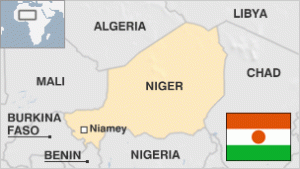 The part I enjoyed most during the competition however was in the negotiations that occurred. Everyone had a resolution, or an idea that they wished to promote. For me, I focused on human trafficking as it affects Niger, particularly in light of the Boko Haram crisis. In order to get my ideas drafted into a resolution, I had to work the room and speak to different delegates to find common ground and similar interests. I thoroughly enjoyed the process of negotiating and coming together with distinct parties to draft a resolution that satisfactorily acknowledged differing goals in a coherent manner.
The part I enjoyed most during the competition however was in the negotiations that occurred. Everyone had a resolution, or an idea that they wished to promote. For me, I focused on human trafficking as it affects Niger, particularly in light of the Boko Haram crisis. In order to get my ideas drafted into a resolution, I had to work the room and speak to different delegates to find common ground and similar interests. I thoroughly enjoyed the process of negotiating and coming together with distinct parties to draft a resolution that satisfactorily acknowledged differing goals in a coherent manner.
Though the competition occurred in November, which is a very busy time for 1L students, I have no regrets and am thankful to have had the opportunity to participate. It really forced me to manage my time, so that I could focus on the competition and also stay on top of all the schoolwork and studying that is required to be successful in law school.
► Chanel Chauvet, 2L, Committee on Peace and Security
As the delegate for the Republic of Niger in the Committee on Peace and Security, I was engaged in the intricate task of educating and debating my fellow delegates about the impact of Boko Haram and al-Qaeda within my state. According to the United Nations, more than 20,000 people have been killed, and 2.2 million people have been internally displaced as a result of the Boko Haram and al-Qaeda.
My primary focus however, involved the potential remedies that the African Union could provide through the use of education. One of the solutions that Niger emphasized in accordance to the “Achieving Freedom From Armed Conflict, Terrorism, Extremism and Intolerance by 2063: Aspirations and 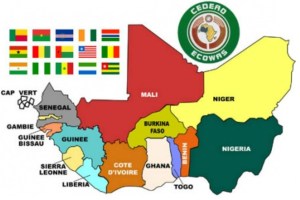 Implementation” topic was the implementation of international humanitarian law (IHL) within school and military curriculums. The International Committee of the Red Cross (ICRC) and Economic Community of West African States (ECOWAS) have considered how treaties related to IHL can be strengthened through the legal system, as detailed here; however, the organizations have yet to explore these other avenues of implementation. Educating the youth about the legal protections and obligations of parties involved and affected by conflict would ultimately serve to generate respect for treaties that promote IHL and prevent conflict.
Implementation” topic was the implementation of international humanitarian law (IHL) within school and military curriculums. The International Committee of the Red Cross (ICRC) and Economic Community of West African States (ECOWAS) have considered how treaties related to IHL can be strengthened through the legal system, as detailed here; however, the organizations have yet to explore these other avenues of implementation. Educating the youth about the legal protections and obligations of parties involved and affected by conflict would ultimately serve to generate respect for treaties that promote IHL and prevent conflict.
Perhaps, what was the most difficult part about the committee process for me was the need to use of parliamentary procedure in order to communicate my points effectively to the other delegates. This required extensive knowledge of the rules and procedure, in order to redirect the committee to certain point favorable to my country. Fortunately, our team had laboriously practiced parliamentary procedure in the weeks leading up to the competition, so we were well-prepared.
Conclusion
Overall, we are grateful for this experience, and pleased with our team performance. We managed to earn the “Best Delegation” award, in addition to numerous individual awards.
We would like to express our sincere gratitude to the Dean Rusk International Law Center at the University of Georgia School of Law and our faculty advisor for extending this opportunity to us. We would also like to thank the African Studies Institute at UGA and its Director for his assistance.





 I had the pleasure of spending last week at the
I had the pleasure of spending last week at the 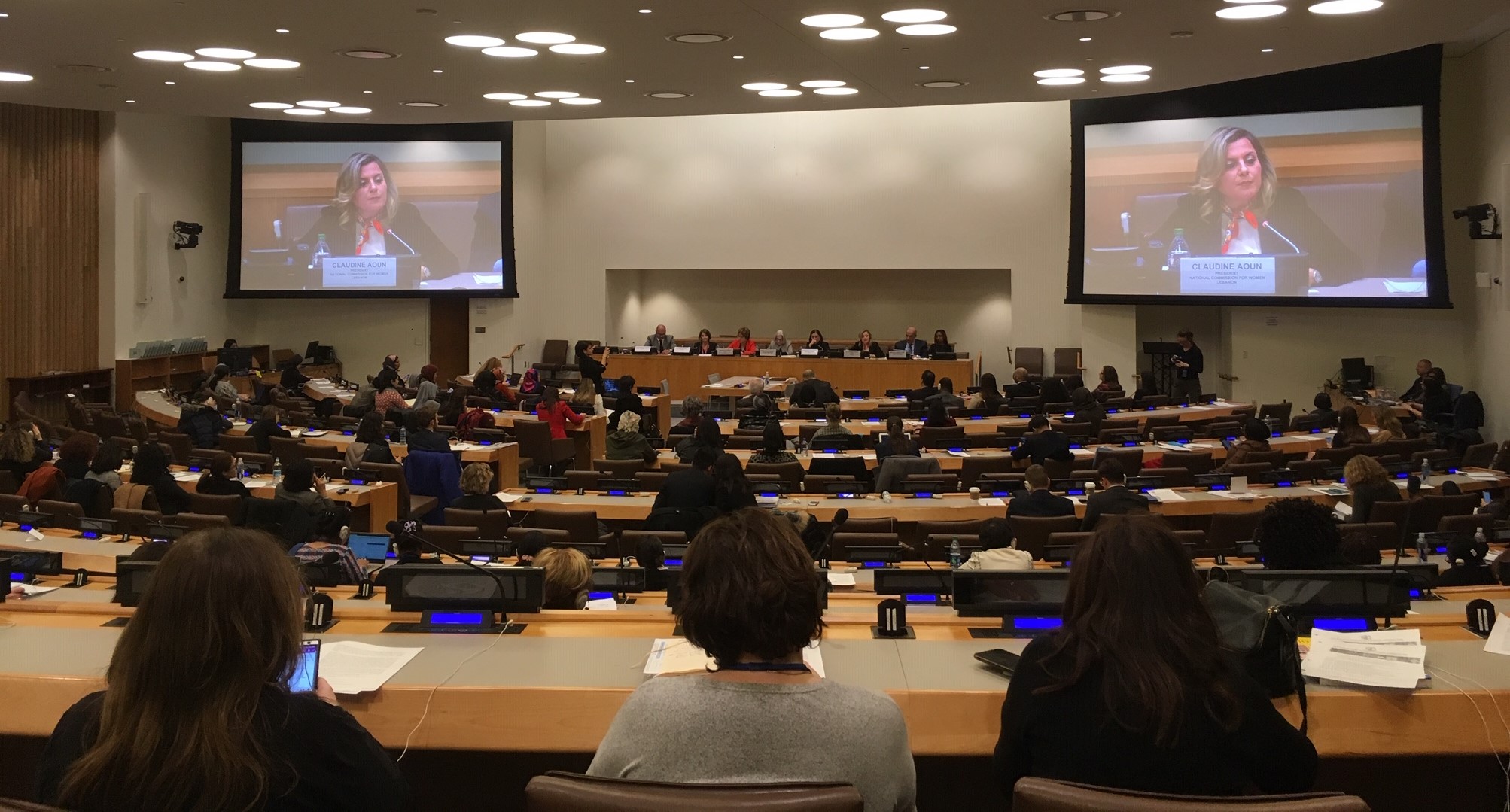
 B
B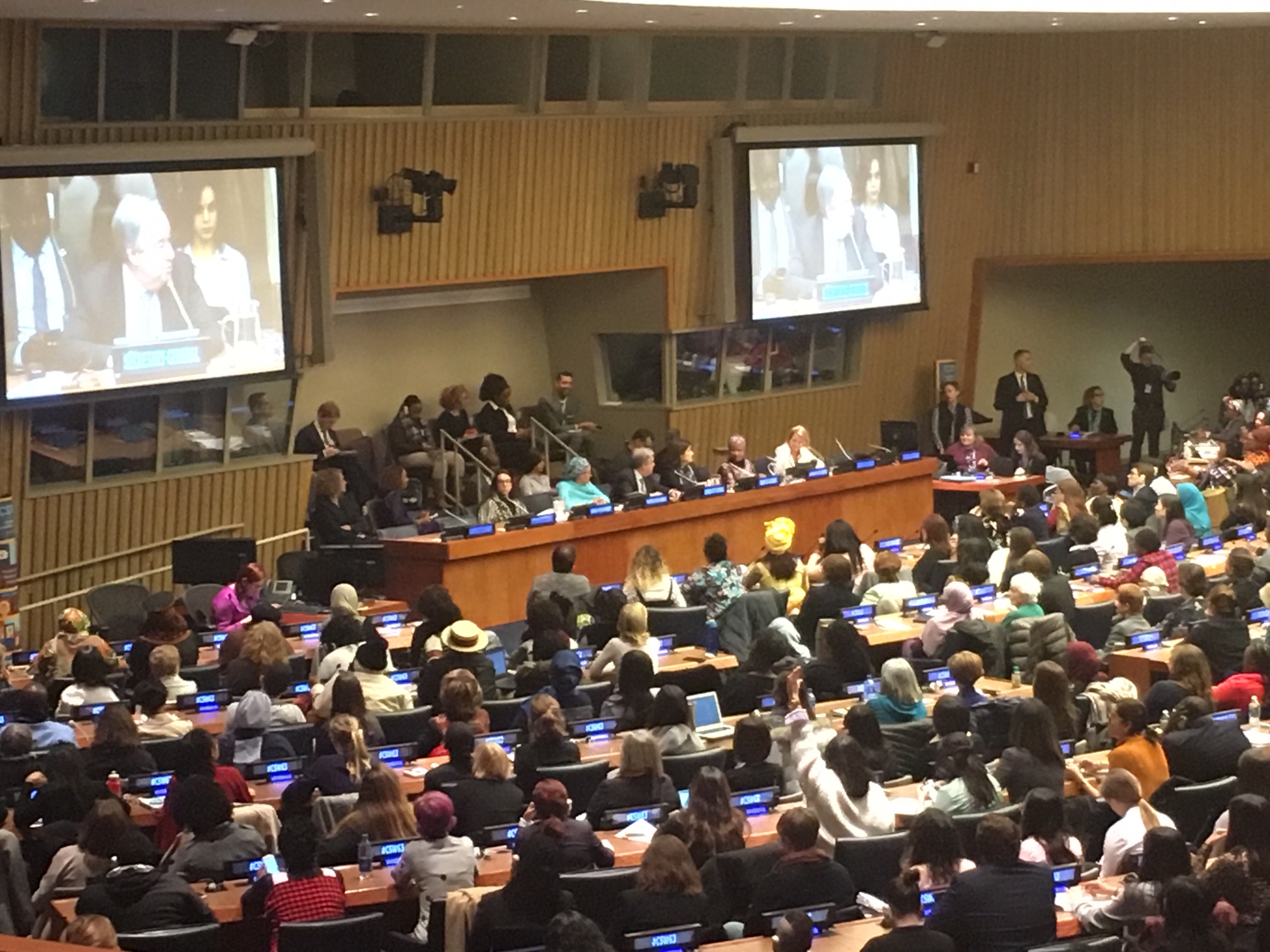 This was my first time attending CSW. It was an incredible gathering, at which impassioned people from around the world worked to improve the the status of women and girls in a range of roles and contexts: participants included government officials, advocates and activists, religious leaders, teachers, and students.
This was my first time attending CSW. It was an incredible gathering, at which impassioned people from around the world worked to improve the the status of women and girls in a range of roles and contexts: participants included government officials, advocates and activists, religious leaders, teachers, and students.



 It’s our pleasure today to publish this post, jointly written by the
It’s our pleasure today to publish this post, jointly written by the 



 The part I enjoyed most during the competition however was in the negotiations that occurred. Everyone had a resolution, or an idea that they wished to promote. For me, I focused on human trafficking as it affects Niger, particularly in light of the
The part I enjoyed most during the competition however was in the negotiations that occurred. Everyone had a resolution, or an idea that they wished to promote. For me, I focused on human trafficking as it affects Niger, particularly in light of the  Implementation” topic was the implementation of
Implementation” topic was the implementation of  That pledge formed the core message of “Ireland, the European Union, and Brexit,” the talk that
That pledge formed the core message of “Ireland, the European Union, and Brexit,” the talk that  Stephens predicted that the UK would retain some relationship with the EU, but said its contours would depend on negotiations between the two. Given the
Stephens predicted that the UK would retain some relationship with the EU, but said its contours would depend on negotiations between the two. Given the  Visitors to Tillar House, the Washington, D.C., headquarters of the American Society of International Law, were treated yesterday to a superb
Visitors to Tillar House, the Washington, D.C., headquarters of the American Society of International Law, were treated yesterday to a superb  One was the
One was the